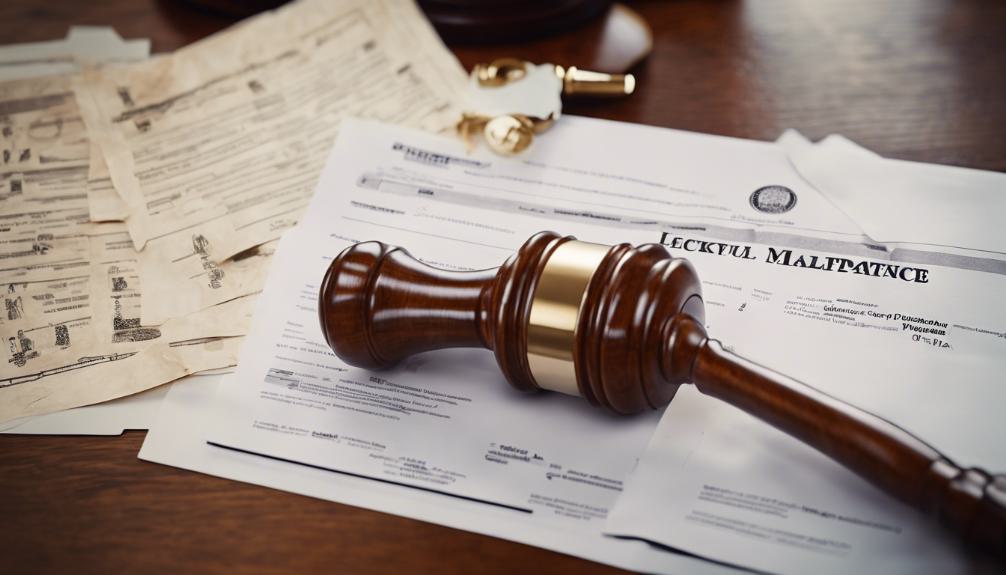Kentucky Personal Injury Laws
Kentucky's personal injury laws embody a complex system, designed to address the myriad challenges faced by individuals who have suffered harm due to the negligence or misconduct of others. This intricate legal landscape encompasses a range of statutes, from motor vehicle laws to workers' compensation regulations. Key to traversing this terrain is an understanding of the specific legal provisions, including the statute of limitations for filing claims and the intricacies of Personal Injury Protection (PIP) coverage. As we explore the nuances of Kentucky's approach to personal injury cases, it becomes evident that the state's legal framework offers both opportunities and obstacles for those seeking justice and compensation.

Key Takeaways
- Kentucky mandates minimum automobile insurance, including PIP, to cover accident-related expenses.
- Workers' Compensation Laws ensure medical treatment and income benefits for workplace injuries.
- The Statute of Limitations for filing personal injury claims in Kentucky is two years.
- Legal resources in Kentucky support victims in navigating compensation claims and injury prevention.
Personal Injury Statistics

In 2020, Kentucky witnessed nearly 380,000 injury-related emergency room visits, highlighting the significant impact of personal injuries within the state. This substantial figure underscores the variety and frequency of accidents occurring across Kentucky, ranging from workplace incidents to slips, trips, and falls in public or private spaces. Additionally, 2019 saw over 38,000 nonfatal workplace injuries reported, underscoring the importance of safety in the work environment and the need for stringent adherence to occupational health standards. These statistics not only reflect the physical and emotional toll on individuals and families but also emphasize the economic burden on the healthcare system and the imperative for effective injury prevention measures. Understanding the scope of personal injuries is essential for stakeholders at all levels, from policymakers to healthcare providers, in mitigating these occurrences.
Motor Vehicle Laws

Shifting focus to another significant aspect, Kentucky's motor vehicle laws play a pivotal role in managing the safety and liability associated with road accidents. In Kentucky, all drivers are required to maintain minimum levels of automobile insurance, including Personal Injury Protection (PIP) coverage. This requirement underscores the state's commitment to ensuring that individuals involved in motor vehicle accidents have access to necessary medical care and financial support, regardless of fault. Moreover, these laws are instrumental in fostering a sense of responsibility among drivers, emphasizing the importance of adhering to safety regulations to minimize the occurrence of accidents. The thorough nature of Kentucky's motor vehicle laws reflects a proactive approach to addressing the complexities of road safety and liability.
Automobile Incident Claims

Delving into the area of automobile incident claims, June 2021 witnessed 366 filings related to such incidents in Kentucky, highlighting the ongoing need for understanding and managing the intricacies of these legal processes. In the domain of personal injury law, automobile incidents stand out due to their frequency and the complexity of claims. Victims of such incidents often face a multifaceted legal landscape, moving through fault determination, damage assessments, and compensation negotiations. Kentucky's legal framework mandates specific procedures for filing and resolving automobile incident claims, emphasizing timely reporting and adherence to statutory guidelines. For individuals involved in such disputes, a thorough comprehension of their rights and responsibilities, along with the procedural aspects of claim filing, is paramount to achieving a fair and just resolution.
Insurance Requirements

Understanding automobile incident claims lays the groundwork for comprehending the nuanced requirements of motor vehicle insurance in Kentucky. In this state, all drivers are mandated to have a minimum level of insurance coverage to legally operate a vehicle. This includes liability insurance, which covers bodily injury and property damage that the policyholder is legally responsible for due to an auto accident. Specifically, Kentucky law requires drivers to carry at least $25,000 for all claims for bodily injury per person, $50,000 for all bodily injuries per accident, and $25,000 for property damage per accident. These minimums guarantee that in the event of an accident, funds are available to cover the costs of damages and injuries, upholding the state's commitment to public safety and financial responsibility on the roads.
Personal Injury Protection

Personal Injury Protection (PIP) coverage is a mandatory requirement for all motorists in Kentucky, providing immediate financial assistance for medical expenses and lost wages following an auto accident, regardless of fault. This unique aspect of Kentucky's motor vehicle laws guarantees that individuals involved in vehicular accidents can access necessary medical care and support without the lengthy process of determining liability. PIP coverage is designed to hasten the provision of benefits, allowing for a smoother recovery process for the injured party. The coverage typically includes a set amount for medical bills and a portion of lost wages, making certain that accident victims are not left financially vulnerable during their recuperation period. This system underscores Kentucky's commitment to safeguarding motorists and their families from the immediate financial impact of road accidents.
Medical Malpractice Laws

Kentucky's medical malpractice laws establish the legal framework for addressing claims of negligence by healthcare professionals and facilities. These laws are designed to protect patients who have suffered harm due to inadequate or incorrect medical treatment. In Kentucky, victims of medical malpractice must file their claims within one year of the injury's discovery, but not more than five years after the act of malpractice occurred. This statute of limitations emphasizes the importance of timely action. Further, Kentucky does not impose a cap on damages, allowing for full recovery based on the extent of harm and losses. To prove malpractice, the claimant must demonstrate that the healthcare provider deviated from the standard of care reasonably expected, directly causing injury or harm.
Product Liability Laws

Product liability laws in Kentucky establish the responsibility of manufacturers and sellers to guarantee their products are safe for consumer use. These laws are pivotal in protecting consumers from harm caused by defective or dangerous products. In Kentucky, if a product causes injury due to its design, manufacture, or a failure to provide adequate warnings, the injured party may have the right to seek compensation. This legal framework covers a wide range of products, including but not limited to, automobiles, household appliances, and pharmaceuticals. The essence of product liability claims in Kentucky underscores the importance of safety and accountability, ensuring that entities involved in the production and sale of goods adhere to the highest standards of consumer protection.
Premises Liability Laws

Premises liability laws in Kentucky hold property owners and occupiers accountable for ensuring their premises are safe for visitors and tenants. This aspect of personal injury law covers a wide range of incidents, including slips, falls, and other injuries that occur on someone else's property. The key element in these cases is the legal concept of negligence. To establish liability, the injured party must prove that the property owner knew or should have known about the hazardous condition and failed to take appropriate action to mitigate the risk. These laws are designed to protect individuals by promoting a safe environment and encouraging property owners to maintain their premises. However, the specifics of each case can vary widely, making it imperative for victims to seek knowledgeable legal counsel to navigate their claims successfully.
Workers Compensation Laws

Workers' compensation laws in Kentucky are designed to provide benefits to employees who are injured or become ill as a direct result of their job. These laws guarantee that workers receive medical treatment, income benefits for lost work time, and compensation for any permanent disability. In Kentucky, most employers are required to carry workers' compensation insurance to cover these benefits, offering a safety net for both employees and employers.
The system operates on a no-fault basis, meaning that employees can receive benefits regardless of who was at fault for their injury or illness. This simplifies the process of obtaining compensation but also limits the ability to sue the employer in most cases. The focus is on recovery and returning to work, with various programs in place to assist with rehabilitation and job placement after a work-related injury or illness.
Compensation Limits

Kentucky law sets specific caps on the amount of compensation an individual can receive for certain types of personal injury claims. These limits are particularly prominent in cases involving medical malpractice, where non-economic damages such as pain and suffering may be subject to a cap. The rationale behind these caps is to prevent the escalation of insurance costs and to maintain a balance in the compensation system. However, economic damages, which cover tangible losses like medical bills and lost wages, are generally not capped. This distinction guarantees that victims can fully recover their financial losses even in the presence of caps on non-economic damages. Understanding these limits is vital for anyone pursuing a personal injury claim in Kentucky.
Statute of Limitations

Understanding compensation limits is just one aspect of handling personal injury claims; another key component is being aware of the time constraints imposed by the statute of limitations for filing such claims in the state. In Kentucky, the statute of limitations for most personal injury cases is two years from the date of the injury. This timeframe is vital as it dictates how long an individual has to initiate legal proceedings against the party at fault. If a claim is not filed within this period, the injured party generally loses the right to seek compensation through the court system. This law underscores the importance of acting promptly after an injury to preserve legal rights and potential compensation.
Legal Resources

Exploring the intricacies of personal injury law in Kentucky requires access to thorough legal resources and support. For individuals moving through the aftermath of an injury, understanding the legal framework is essential. Kentucky offers a variety of legal resources aimed at educating and assisting the public. These include government websites, which provide up-to-date information on laws and regulations, and local law libraries that offer extensive collections of legal publications and access to legal databases. Additionally, numerous non-profit organizations and legal clinics offer guidance and support to those dealing with personal injury cases. These resources are invaluable for gaining a full understanding of one's rights and the legal options available. Accessing these resources can have a significant impact on the outcome of personal injury claims in Kentucky.
Insurance and Legal Aid

Exploring the complexities of insurance requirements and accessing legal aid are essential steps for individuals seeking justice and compensation after a personal injury in Kentucky. Kentucky mandates business liability insurance to safeguard businesses and customers, a critical aspect for personal injury cases. Additionally, Kentucky Legal Aid provides indispensable services for those unable to afford legal representation, ensuring access to justice is not limited by financial constraints.
The Kentucky Injury Prevention and Research Center plays a pivotal role in preventing injuries through research and education, directly impacting insurance policies and legal practices. Resources such as Expertise.com offer guidance in finding specialized legal professionals. Understanding these elements helps victims navigate the legal landscape, advocating for their rights and securing the necessary compensation.
Frequently Asked Questions
How Do I Determine if My Personal Injury Case Qualifies for a Lawsuit in Kentucky?
To determine if your personal injury case qualifies for a lawsuit, consider the incident's specifics, injuries sustained, and potential negligence involved. Consulting with a legal professional experienced in state laws is highly recommended.
What Are the Steps to Take Immediately After Suffering a Personal Injury in Kentucky to Ensure I Can Pursue Legal Action?
Immediately after incurring a personal injury in Kentucky, seek medical attention, report the incident (e.g., to your employer for workplace injuries or police for auto accidents), document evidence, and consult a qualified attorney promptly.
How Does Kentucky's Comparative Fault Rule Affect My Ability to Recover Damages in a Personal Injury Lawsuit?
Kentucky's comparative fault rule may reduce your damage recovery in a personal injury lawsuit based on your percentage of fault. Understanding this rule is critical for accurately evaluating potential compensation in such legal disputes.
Can I File a Personal Injury Claim in Kentucky if the Injury Occurred Out of State but Involves a Kentucky-Based Company or Individual?
In the domain of legal claims, the jurisdictional boundaries can blur when incidents cross state lines. Filing a personal injury claim in Kentucky for an injury occurring out-of-state but involving a Kentucky entity is potentially viable.
What Types of Evidence Are Most Effective in Proving Negligence in a Kentucky Personal Injury Case?
In proving negligence in a personal injury case, the most effective types of evidence include eyewitness statements, medical reports, expert testimonies, photographs of the scene, and video footage, which collectively establish the defendant's liability.
Conclusion
By pondering the intricate tapestry of Kentucky's personal injury statutes offers a beacon of hope for individuals steering through the tumultuous aftermath of untimely mishaps. Through a meticulous exploration of statistical data, legislative frameworks, and supportive resources, a clearer path is illuminated for those seeking redress and restoration. It is imperative that affected parties avail themselves of the legal avenues and protective measures ensconced within the state's jurisprudence to make sure a semblance of equilibrium is restored post adversity.

This post has been generated by AI and was not reviewed by editors. This is Not legal advice. Please consult with an attorney.




